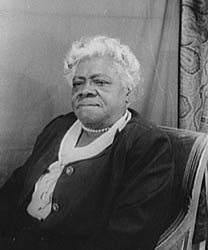Mary McLeod Bethune
|
|
for the wife of John Joseph Caldwell Abbott, see Mary Bethune Abbott
Mary Jane McLeod Bethune (July 10, 1875-May 18, 1955), born to former slaves a decade after the end of the American Civil War, devoted her life to ensuring the right to education and freedom from discrimination for black Americans. Bethune believed that through education, blacks could begin to earn a living in a country that still opposed racial equality. Bethune worked tirelessly until her death and would not rest while there was "a single Negro boy or girl without a chance to prove his worth."
Mary Jane McLeod was born on July 10, 1875, in Mayesville, South Carolina. Fortunate in that she was able to gain a formal education, Bethune had originally hoped to become a missionary in Africa. However, she realized that "Africans in America needed Christ and school just as much as Negroes in Africa. . . . My life work lay not in Africa but in my own country." She first taught school in Georgia and later in South Carolina, Florida and Illinois. As a young teacher in Chicago, she visited prisoners in jail, giving them inspiration through song. She worked at the Pacific Garden Mission, serving lunch to the homeless, and counseled the residents of Chicago's slums. In Florida, she organized a Sunday school program and sang to prisoners.
In 1904, Bethune opened the Daytona Normal and Industrial Institute for Negro Girls. The school opened with five girls as students and later accepted boys as well. Tuition was 50 cents a week, but Bethune never refused to educate a child whose parents could not afford the payment. Bethune worked not only to maintain the school, but she also fought aggressively the segregation and inequality facing blacks. There was objection from many at that time to the education of black children, but Bethune's zeal and dedication won over many skeptics of both races. She encouraged people to "Invest in the human soul. Who knows, it might be a diamond in the rough." Bethune also opened a high school and a hospital for blacks. She had immense faith in God and believed that nothing was impossible. Bethune remained president of the school for more than 40 years. In 1923, she oversaw the school's merger with the Cookman Institute, thereby forming the Bethune-Cookman College.
Drbethunestamp.gif
With her school a success, Bethune became increasingly involved in political issues. It was through her discussions with Vice President Thomas Marshall that the Red Cross decided to integrate, and blacks were allowed to perform the same duties as whites. In 1917, she became president of the Florida Federation of Colored Women. In 1924, Bethune became president of the National Association of Colored Women, at that time the highest national office a black woman could aspire. And in 1935, she formed the National Council of Negro Women to take on the major national issues affecting blacks.
Bethune worked for the election of Franklin D. Roosevelt in 1932, and attempted to get him to support a proposed law against Lynching. Although the Costigan-Wagner bill was not passed, they did raise more public awareness of the lynching issue. She was also a member of Roosevelt's Black Cabinet.
Bethune served as director of the National Youth Administration's Division of Negro Affairs (1936), Vice-President of the NAACP (1940), and served on President Truman's Committee of Twelve for National Defense (1951). She also continued working with many organizations, such as the National Urban League, the Association of American Colleges, and the League of Women Voters.
She worked under presidents Calvin Coolidge, Herbert Hoover, and Theodore Roosevelt on child welfare, housing, employment, and education. In June of 1936, she was assigned director of the Division of Negro Affairs and became the first black woman to serve as head of a federal agency. As director, she traveled across the country, speaking out for equal education and treatment for blacks.
Mary McLeod Bethune died on May 18, 1955, in Daytona Beach, Florida, leaving a legacy of interracial cooperation and increased educational opportunity for blacks. Thanks to the efforts of NCNW President Dorothy Height, her exemplary life of service to others has been honored in the form of a statue which graces Washington, DC's Lincoln Park. She is the first black woman to be honored in this way. A 12-foot bronze statue of Dr. Bethune was also unveiled on the Bethune-Cookman College campus in January, 2005
External links
- Mary McLeod Bethune, Educator (http://www.floridamemory.com/OnlineClassroom/MaryBethune/) from the State Archives of Florida

